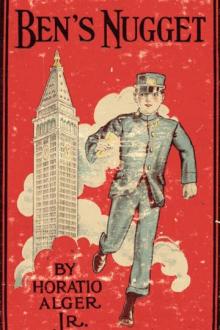Andy Grant's Pluck, Jr. Horatio Alger [kiss me liar novel english .TXT] 📗

- Author: Jr. Horatio Alger
Book online «Andy Grant's Pluck, Jr. Horatio Alger [kiss me liar novel english .TXT] 📗». Author Jr. Horatio Alger
"But what will you do for an income, Sterling?"
"I can work out by the day. Perhaps the man who buys our farm—I hear the squire has got a purchaser for it—will employ me."
"To work out by the day at your age, Sterling!" said his wife, indignantly.
"It will be hard, but if it is necessary I can do it."
"But I want to help, Sterling. I can get sewing to do."
"No, no; I won't consent to that."
"Then I won't consent to your working by the day."
"Well, we won't discuss it to-night. We will let the future take care of itself."
Just then the noise of wheels was heard, and a buggy stopped at the door.
"I do believe it's Andy!" exclaimed Mrs. Grant, joyfully.
It was Andy. A minute later, he was in the house.
"I am late," he said. "I lost the regular train, and had to get off at Stacy, six miles away; but I got a man from the stable to bring me over."
"I am glad to see you, Andy," said his mother.
"And so am I," added Sterling Grant, "though it is a sad time."
"Why a sad time, father?"
"The squire will foreclose to-morrow."
"No, he won't foreclose, father. I will stop it."
"But how can you prevent it, my son?"
"By paying the three thousand dollars, father."
"Have you got the money?" asked his father, incredulously.
"Yes."
"But how—?"
"Don't ask me any questions, father. Be satisfied with the knowledge that I have got it."
"Heaven be praised!" said the farmer, fervently.
"I don't think Squire Carter will say that."
CHAPTER XXXVII. — CONCLUSION.
A little before twelve o'clock on the following day, Squire Carter rang the bell at the farmhouse door. He was dressed with scrupulous neatness, and there was a smile of triumphant anticipation on his face.
Andy answered the bell.
"Walk in, squire," he said.
"Ha! So you are home, Andy?"
"Yes, sir."
"Ahem! Your father has been unfortunate."
"Then you intend to foreclose?"
"Yes; I need the money and must have it."
"Isn't that rather hard on an old neighbor?"
"You are a boy, Andy, and don't understand. Business is business."
"Well, come in."
Mr. and Mrs. Grant were sitting by the fireplace. They looked calm, not sorrowful, as the squire anticipated.
"Ahem! My friends, I am sorry for you!" said the squire, in a perfunctory way. "Life is full of disappointments, as we read in the Scriptures."
"What do you propose to do with the farm, squire?" asked the farmer, calmly.
"I may sell it, if I can find a purchaser. I haven't thought much about it."
"That is right, squire. It isn't well to count your chickens before they are hatched."
It was Andy who spoke.
"Andrew, you are very flippant," said the squire, displeased. "I apprehend that there is very little doubt as to my having the farm to sell."
"What do you suppose is going to become of my father?"
"That is not for me to say. If I run the farm I may hire him to work on it."
"He has made up his mind to work on it."
"With or without my permission?" said the squire, with a sneer.
"Exactly so."
"I don't understand you," said the squire, with dignified displeasure.
"I presume not, but you will understand better when I say that he stands prepared to pay off the mortgage, and the farm will remain his."
"Impossible!" ejaculated the squire, turning pale.
"Quite possible, sir. Have you the mortgage with you?"
"Yes."
"Here is a release which you will please sign. Father, you had better pay the squire at once."
Mr. Grant took out a big wallet, and counted out thirty one-hundred-dollar bills.
"I believe that is correct, squire," he said.
"No, it isn't. You haven't paid the interest," snarled the squire.
"Here is another hundred dollars—that will cover it."
Ten minutes later Squire Carter left the farmhouse with a heavy frown upon his face. He was bitterly disappointed, and the money did not console him.
This was not the last of his disappointments. His brother's widow in New York sued him for an accounting of his father's estate, and he was obliged, not long afterward, to pay her five thousand dollars. This put the widow and her son in a comfortable position, but seriously embarrassed the squire, who had lost money by ill-advised speculation.
Two years later he had to sell his fine place and take a much humbler one half a mile from the village. Conrad was obliged to seek a place, and is bitterly humiliated because he receives but four dollars a week, while the boy he used to look down upon is prosperous and successful.
Andy has sold out his property in Tacoma to such advantage that he counts himself worth twenty thousand dollars. He continues to live in handsome style with his friend, Walter Gale, and is to be taken into partnership in the real estate office by Mr. Crawford when he attains the age of twenty-one.
Of the less important characters in our story it may be said that Byron Warden has had a story published in the nickel library, and is very proud of this measure of success. He continues to write poems for the Century and other prominent magazines. They always come back to him "respectfully declined," but he cherishes the hope that some day he will receive a more favorable answer.
Valentine Burns holds a place in Mr. Crawford's





Comments (0)